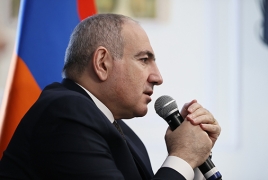
Armenian Prime Minister Nikol Pashinyan, responding to an Azerbaijani journalist's inquiry in Tirana, emphasized that Armenia's constitution does not assert any territorial claims against neighboring countries. He clarified that, although a new constitution is not yet drafted, analyses and the Constitutional Court's decision confirm the current constitution lacks such claims.
Pashinyan highlighted that Azerbaijan's concerns about Armenia's Constitution are addressed in the draft peace agreement between the two nations. This agreement, based on the 1991 Almaty Declaration, stipulates mutual recognition of sovereignty and territorial integrity, transforming former Soviet administrative borders into state borders. He stated, "Soviet Azerbaijan is independent Azerbaijan, Soviet Armenia is independent Armenia."
The Prime Minister noted that the agreement includes provisions where both parties commit to refraining from territorial claims now and in the future. He also mentioned a clause preventing either side from using domestic legislation to obstruct the agreement's implementation. Once ratified by Armenia's parliament, the treaty would hold supreme legal authority over national laws.
Addressing Azerbaijan's demand to dissolve the OSCE Minsk Group, Pashinyan proposed simultaneous signing of the peace agreement and a joint request to the OSCE for the group's dissolution. This approach aims to prevent the perception of shifting the conflict into Armenia's territory.
Pashinyan acknowledged Armenia's concerns regarding Azerbaijan's Constitution, which he says contains territorial assertions towards Armenia. However, he expressed a preference for resolving such issues through the peace agreement rather than public disputes.
He reaffirmed Armenia's readiness to sign and ratify the peace agreement, urging Azerbaijan to do the same. Pashinyan emphasized that the agreement's ratification would legally confirm Armenia's lack of territorial claims against any neighbor.

